Featured Articles
Wladimir Klitschko Embraced Al Davis’s Mantra: “Just Win, Baby”
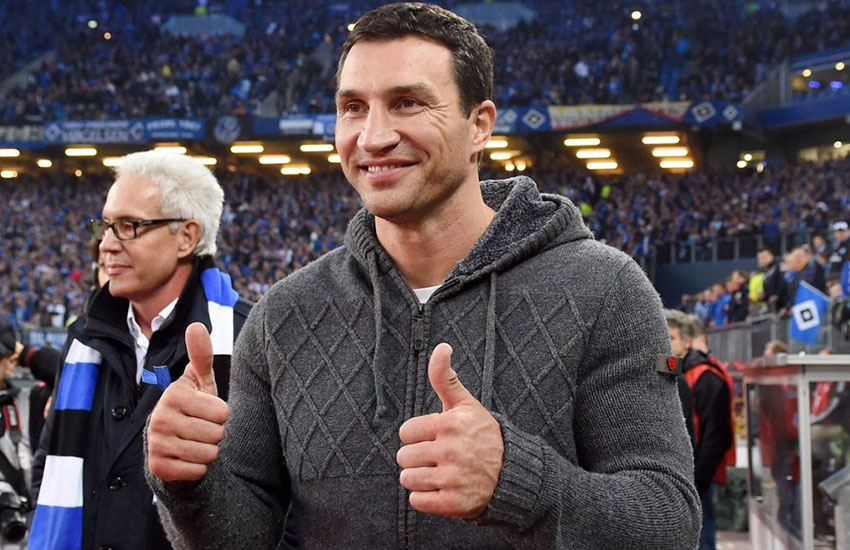
Having maintained a home in Los Angeles for several years, there is at least a chance now-retired two-time heavyweight champion Wladimir Klitschko has some knowledge of Al Davis, the maverick former coach, general manager and principal owner of the NFL’s Raiders, in both their Oakland (twice) and L.A. residencies.
After the then-Los Angeles Raiders had hammered the Washington Redskins, 38-9, to win Super Bowl XVIII in Tampa, Fla., on Jan. 22, 1984, a smiling and self-satisfied Davis repeated to CBS interviewer Brent Musburger what already had become his and his team’s enduring catchphrase: “Just win, baby.”
If there is a difference between a just-win Klitschko – whose retirement announcement on Wednesday, depending upon one’s point of view, was either shocking or very much expected – and Davis, it is in the manner in which they went about the victory process. Davis was always a proponent of the quick strike, forever fond of quarterbacks who could launch the long ball and often did. His prototypical passer was Daryle “The Mad Bomber” Lamonica, who would send receivers Warren Wells, Fred Biletnikoff and Raymond Chester sprinting downfield on go routes until they were totally gassed or hauled in a couple of touchdown throws, whichever came first. Thirty-three years after Lamonica retired from the Raiders in 1974, Davis used the first pick in the NFL draft to select LSU rocket-launcher JaMarcus Russell, who had Lamonica’s big arm but was hardly a Tom Brady when it came to conditioning or the mental aspects of a complex game. Russell was out of the league after three hugely disappointing seasons, one of the most colossal busts in NFL history.
The 41-year-old Wladimir “Dr. Steelhammer” Klitschko – who received a Ph.D. in sports science from the University of Kiev and speaks four languages (Ukrainian, Russian, German and English) – always had been a dash of Lamonica and heavy doses of Frank Ryan, a fellow Ph.D. and former quarterback who is best known for leading the Cleveland Browns to their last NFL title (1964), far less for publishing two seminal papers in the Duke Mathematical Journal.
At 6-foot-6 and 245 or so pounds distributed on a chiseled physique reminiscent of Michelangelo’s David, the younger of the highly educated heavyweight champion Klitschko brothers – former WBC titlist Vitali “Dr. Ironfist” Klitschko, now 46, retired in 2013 and is the mayor of Kiev – could, and did, win using whichever method he deemed to be the most logical in a particular situation. He could air it out, if that best suited his purpose, as evidenced by the 54 knockouts he registered in fashioning a 64-5 record during a 21-year professional journey that five years hence will result in first-ballot induction into the International Boxing Hall of Fame. But Wlad, whose fragile chin was never his strong suit, was wise enough to understand that always going for broke in the ring sometimes can break even a heavyweight wielding a figurative steel hammer. He lost title bouts inside the distance to Corrie Sanders and Lamon Brewster, neither of whom will ever have a plaque in the IBHOF, and even had to overcome three knockdowns en route to a points nod over Samuel Peter in the first of their two meetings. And when Wlad also was dropped three times in his most recent bout, an 11th-round TKO loss to huge (6-6, 250), young (27) and strong Anthony Joshua on April 29, in which Joshua retained his IBF title and also annexed the vacant WBA belt before a crowd of 90,000 in London’s Wembley Stadium, a seed undoubtedly was planted in Klitschko’s analytical mind that apparently blossomed with Wednesday’s retirement announcement.
“… I’ve traveled the world, learned new languages, created businesses, built intellectual properties, helped people in need, became a scientist, entrepreneur, motivator, hotelier, trainer, investor and much else,” the statement read. “I was and am still capable of doing all this because of the global appeal of boxing. At some point in our lives we need to, or just want to, switch our careers and get ourselves ready for the next chapter and chart new courses toward fresh challenges.”
Reading the intelligently worded statement, I have no doubt it is factually correct and was actually composed by Wlad and not by a hired publicist, many of whom function as apologists for coarse practitioners of the pugilistic arts incapable of speaking complete sentences without a steady stream of vulgarities. Some fighters don’t seem to need or want such functionaries; witness the f-bomb-congested, four-city press tour to hype the upcoming Floyd Mayweather Jr.-Conor McGregor carnival sideshow. Raise your hand, perhaps sheepishly, if you are drawn to that bizarre matchup because of its gutter-level lead-up rather than in spite of it.
Klitschko, on the other hand, referred to the exciting slugfest pitting Olympic super heavyweight gold medalists (Wlad got his in 1996, Joshua in 2012) as a confrontation of “gentlemen,” staying classy despite the realization that he quite possibly was one big punch from career-rejuvenating success after he dropped the favored Briton in the sixth round, with over two minutes remaining to seal the deal. He didn’t, but considering his relatively advanced age and career-long 17 months of inactivity between his uninspired dethronement on points by Tyson Fury and showdown with Joshua, it could be argued that Wlad had been involved in his most exciting fight in years, and maybe ever. He immediately announced his intention to exercise the rematch clause in his contract, but with his retirement announcement negotiations for a do-over – in which the Kazakhstan-born, Ukrainian-raised son of a Soviet Air Force colonel stood to make upwards of $20 million on Nov. 11 at Las Vegas’ T-Mobile Center – ended.
Fight fans are left to debate whether Wlad could have or would have spanked Joshua prime-on-prime, but such exquisitely timed confrontations of elite boxers are relatively rare. Someone always is on the way up, someone always is on the way down. Having lost back-to-back scraps for the first time as a pro, and already affluent enough to consider the move into a rewarding next phase of his life, the erstwhile “Dr. Steelhammer” again chose the safe course. Who knows? Maybe he was influenced by last week’s report issued by the American Medical Association that, of 111 deceased NFL players who had donated their brains for scientific research, 110 had varying degrees of Chronic Traumatic Encephalopathy (CTE). In boxing, the gradual and silent thief of mental faculties is pugilistica dementia, which can debilitate the body even as it wipes clean memories of boxing glory, and pretty much everything else. No one can fault Klitschko if he is stepping away to ensure more quality time in the long term with his fiancée, American actress Hayden Panettiere, and the couple’s 2½-year-old daughter, Kara Evdokia Klitschko. If the child turns out to be anywhere near as smart as her pop, perhaps Wlad soon will be reading Dostoevsky bedtime passages to her instead of Mother Goose nursery rhymes.
Of course, book smarts and ring smarts are not mutually inclusive. Wlad always marched to the tune of his own drummer, even when doing so put him somewhat at odds with his late, great trainer, Emanuel Steward, who constantly preached the gospel of Al Davis-like aggression and often stood by, perplexed, as one of his most accomplished pupils formulated his own fight plans on the fly. Manny always wanted to see a little more of let ’er rip Thomas Hearns in Wlad, and sometimes got an XXL-sized version of master technician Willie Pep.
“For one-punch power, Wladimir tops them all,” Steward, who was Klitschko’s chief second for 17 bouts prior to his death, at 68, on Oct. 25, 2012, once said. “If he ever becomes more aggressive and just went after people, he could be the most devastating puncher ever. I’ve trained many fighters and Wladimir is one of the few who can turn out the lights without using the dimmer switch first.”
Had Klitschko attempted to tailor his style to fit Steward’s more action-packed specifications, there is at least a possibility he would have placed higher than No. 16 in a recent poll of 30 trainers, historians, matchmakers and media members conducted by The Ring magazine to determine the top 20 heavyweight champions of all time. He also might have been more often on the wrong end of knockouts, as was the case when he threw down with Sanders and Brewster. His stylistic choices make for a debate with no quantifiable resolution.
Before his April 25, 2015, title defense against Bryant Jennings in Madison Square Garden, with Steward disciple Johnathan Banks serving as his chief second, Klitschko – who would win by unanimous decision – explained that he never was one to adhere to strict dictums. Every fight is different and, well, it’s like Al Davis declared. The first rule of athletic competition, be it boxing, football or whatever, is to just win, baby.
“I cannot make the fight by myself,” Wlad explained. “I need somebody who wants to fight back. That’s what makes an exciting fight. If somebody just doesn’t want to get knocked out, it’s very difficult because you have to chase him.
“There have been different fights I’ve had in the 25 years (including amateurs) of my career. I do have different qualities of boxing and punching and, if it’s needed, of clinching. It doesn’t matter. I know the game and I know how to win to have lasted this long.”
Fighting primarily in Europe, most often Germany, during his extended heyday, Klitschko never felt the need to apologize for the 160-plus clinches in which he was engaged, many initiated by him, in a unanimous decision over Russia’s Alexander Povetkin on Nov. 5, 2013, in Moscow. He would have been lustily booed for that performance in the U.S., but he did what he felt he had to do to win. End of story.
And now the end of the story, at least the boxing part of it, really is here. Some will dismiss his lengthy time upon the heavyweight throne – 29 title bouts spanning two reigns, breaking the record of 28 held by the legendary Joe Louis – as being too boring, too casually dominant in most instances. But guess what? Floyd Mayweather Jr. has followed more or less the same path, with far fewer knockouts and significantly more expletives uttered. Art appreciation is a matter of individual taste, whether the canvases being examined offer comparisons between Tyson and Ali or Monet and Picasso.
Now that Wladimir Klitschko has signalled his intention to take his leave, probably for keeps, an appreciation is in order. He utilized his superior power selectively, but with telling effect, and he called upon his myriad other skills as warranted. Most of all, though, he remained a bastion of honor and dignity in a profession that sometimes is bereft of both qualities.
To comment on this article at The Fight Forum, CLICK HERE.
Check out more boxing news on video at The Boxing Channel.
Featured Articles
Avila Perspective, Chap. 326: A Hectic Boxing Week in L.A.
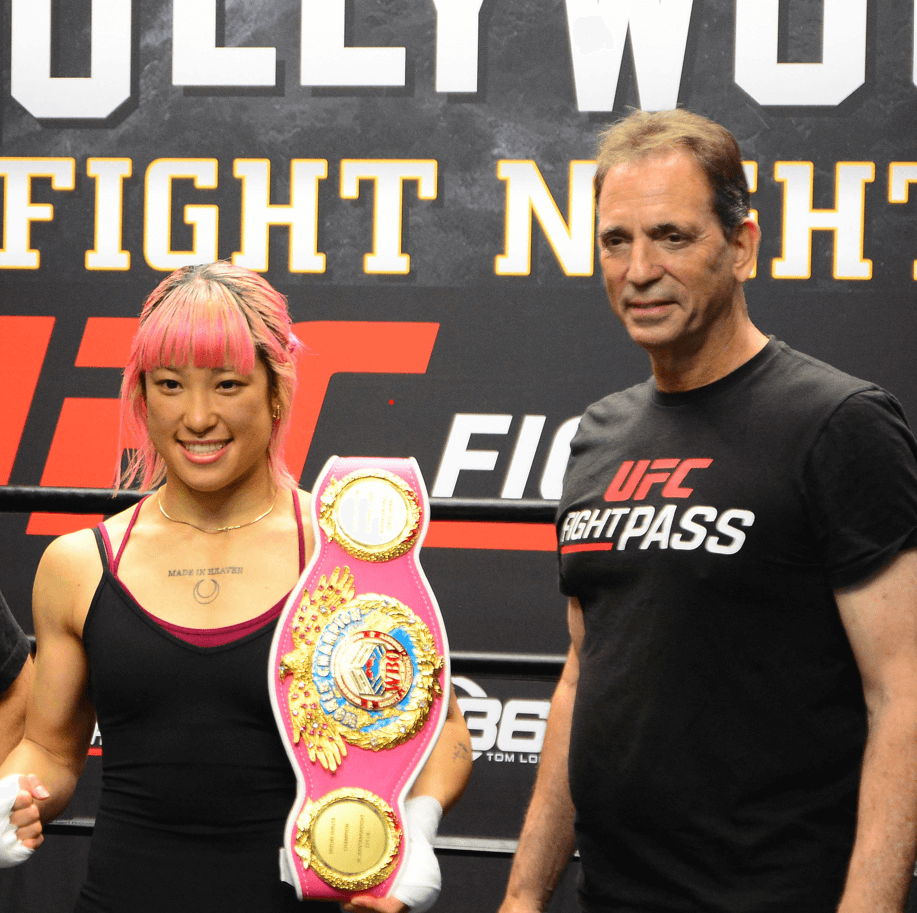
The Los Angeles area is packed with boxing.
Japan’s Mizuki “Mimi” Hiruta, Ukraine’s Serhii Bohachuk, and the indefatigable Jake Paul are all in the Los Angeles area this week.
First, Hiruta (7-0, 2 KOs) defends the WBO super flyweight title against Argentina’s Carla Merino on Saturday May 17, at Commerce Casino. The 360 Boxing Promotions card will be streamed on UFC Fight Pass.
Voted Japan’s best female fighter, Hiruta faces a stiff challenge from Merino who traveled thousands of miles from Cordoba.
360 Promotions is one of the top promotions especially when it comes to presenting female prizefighting. Two of their other female fighters, Lupe Medina and Jocelyn Camarillo, will also be fighting on Saturday.
They are not only promoting female fighters. They have several top male champions including Bohachuk and Omar “Trinidad performing this Saturday.
Don’t miss this show at Commerce Casino.
“This card is one of the deepest cards we’ve promoted in Southern California which has been proven by the rush for tickets and the wealth of media interest. Serhii, Omar and Mizuki are three of the top fighters in their respective weight classes and it’s a great opportunity for fans to see a full night of action,” said Tom Loeffler of 360 Promotions.
Jake and Chavez Jr. in L.A.
Jake Paul took time off from training in Puerto Rico to visit Los Angeles to hype his upcoming fight against former world champion Julio Cesar Chavez Jr. next month.
“The fans have wanted to see this, and I want to continue to elevate and raise the level of my opponents,” said Paul, 28. “This is a former world champion, and he has an amazing resume following in his dad’s footsteps.”
Paul, who co-owns Most Valuable Promotions with Nakisa Bidarian, last staged a wildly successful boxing card that included Amanda Serrano versus Katie Taylor and of course his own fight with Mike Tyson.
It set records for viewing according to Netflix with an estimated 108 million views.
Paul (11-1, 7 KOs) is set to face Chavez (54-6-1, 34 KOs) in a cruiserweight battle at the Honda Center in Anaheim, Calif. on June 28. DAZN pay-per-view will stream the Golden Boy Promotions and MVP fight card that includes the return of Holly Holm to the boxing world after years in MMA.
No one should underestimate Paul who does have crackling power in his fists. He is for real and at 28, is in the prime of his boxing career.
Yes, he is a social influencer who got into boxing with no amateur background, but since he engaged fully into the sport, Paul has shown remarkable improvement in all areas.
Is he perfect? Of course not.
But power is the one attribute that can neutralize any faults and Paul does have real power. I witnessed it when I first saw him in the prize ring in Los Angeles many years ago.
Chavez, 39, the son of Mexico’s great Julio Cesar Chavez, is not as good as his father but was talented enough to win a world title and hold it until 2012 when he was edged by Sergio Martinez.
The son of Chavez last fought this past July when he defeated former UFC fighter Uriah Hall in a boxing match held in Florida. He has been seeking a match with Paul for years and finally he got it.
“I need to prepare 100%. This is an interesting fight. It might not be easy, but I’m going to do the best I can to be the best person I am, but I think I’m going to take him,” said Chavez.
Paul was not shy about Chavez’s talent.
“This is his toughest fight to date, and I’m going to embarrass him and make him quit like he always does,” said Paul about Chavez Jr. “I’m going to expose and embarrass him. He’s the embarrassment of Mexico. Mexico doesn’t even claim him, and he’s going to get exposed on June 28.”
Also on the same fight card is unified cruiserweight champion Gilberto “Zurdo” Ramirez (47-1, 30 KOs) who defends the WBA and WBO titles against Yuniel Dorticos (27-2, 25 KOs).
In a surprising addition, former boxing champion Holm returns to the boxing ring after 12 years away from the sport. Can she still fight?
Holm (33-2-3, 9 KOs) meets Mexico’s Yolanda Vega (10-0, 1 KO) in a lightweight fight scheduled for 10 rounds. Holm is 43 and Vega is 29. Many eyes will be looking to see the return of Holm who was recently voted into the International Boxing Hall of Fame.
Wild Card Honored by L.A. City
A formal presentation by the Los Angeles City Council to honor the 30th anniversary of the Wild Card Boxing Club takes place on Sunday May 18, at 1:30 p.m. The ceremony takes place in front of the Wild Card located at 1123 Vine Street, Hollywood 90038.
Along with city councilmembers will be a number of the top first responder officials.
Championing Mental Health
A star-studded broadcast team comprised of Al Bernstein, Corey Erdman and Lupe Contreras will announce the boxing event called “Championing Mental Health” card on Thursday May 22, at the Avalon Theater. DAZN will stream the Bash Boxing card live.
Among those fighting are Vic Pasillas, Jessie Mandapat and Ricardo Ruvalcaba.
For more information including tickets go to www.555media.com/tickets.
Fights to Watch
Sat. UFC Fight Pass 7 p.m. Mizuki Hiruta (7-0) vs Carla Merina (16-2).
Thurs. DAZN 7 p.m. Vic Pasillas (17-1) vs Carlos Jackson (20-2).
Mimi Hiruta / Tom Loeffler photo credit: Al Applerose
Featured Articles
Sam Goodman and Eccentric Harry Garside Score Wins on a Wednesday Card in Sydney
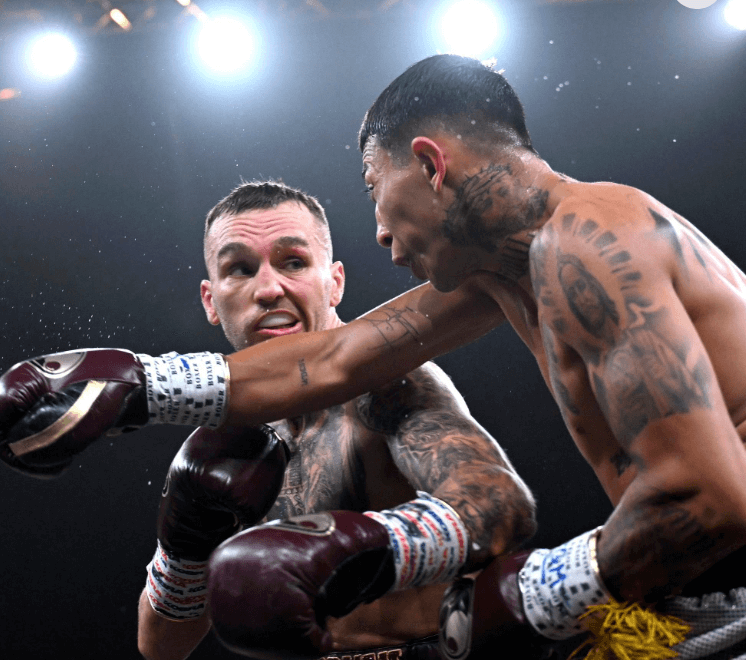
Australian junior featherweight Sam Goodman, ranked #1 by the IBF and #2 by the WBO, returned to the ring today in Sydney, NSW, and advanced his record to 20-0 (8) with a unanimous 10-round decision over Mexican import Cesar Vaca (19-2). This was Goodman’s first fight since July of last year. In the interim, he twice lost out on lucrative dates with Japanese superstar Naoya Inoue. Both fell out because of cuts that Goodman suffered in sparring.
Goodman was cut again today and in two places – below his left eye in the eighth and above his right eye in the ninth, the latter the result of an accidental head butt – but by then he had the bout firmly in control, albeit the match wasn’t quite as one-sided as the scores (100-90, 99-91, 99-92) suggested. Vaca, from Guadalajara, was making his first start outside his native country.
Goodman, whose signature win was a split decision over the previously undefeated American fighter Ra’eese Aleem, is handled by the Rose brothers — George, Trent, and Matt — who also handle the Tszyu brothers, Tim and Nikita, and two-time Olympian (and 2021 bronze medalist) Harry Garside who appeared in the semi-wind-up.
Harry Garside
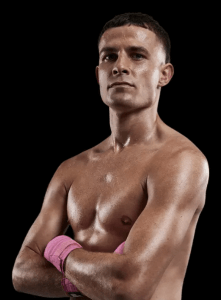
Harry Garside
A junior welterweight from a suburb of Melbourne, Garside, 27, is an interesting character. A plumber by trade who has studied ballet, he occasionally shows up at formal gatherings wearing a dress.
Garside improved to 4-0 (3 KOs) as a pro when the referee stopped his contest with countryman Charlie Bell after five frames, deciding that Bell had taken enough punishment. It was a controversial call although Garside — who fought the last four rounds with a cut over his left eye from a clash of heads in the opening frame – was comfortably ahead on the cards.
Heavyweights
In a slobberknocker being hailed as a shoo-in for the Australian domestic Fight of the Year, 34-year-old bruisers Stevan Ivic and Toese Vousiutu took turns battering each other for 10 brutal rounds. It was a miracle that both were still standing at the final bell. A Brisbane firefighter recognized as the heavyweight champion of Australia, Ivic (7-0-1, 2 KOs) prevailed on scores of 96-94 and 96-93 twice. Melbourne’s Vousiuto falls to 8-2.
Tim Tsyzu.
The oddsmakers have installed Tim Tszyu a small favorite (minus-135ish) to avenge his loss to Sebastian Fundora when they tangle on Sunday, July 20, at the MGM Grand in Las Vegas.
Their first meeting took place in this same ring on March 30 of last year. Fundora, subbing for Keith Thurman, saddled Tszyu with his first defeat, taking away the Aussie’s WBO 154-pound world title while adding the vacant WBC belt to his dossier. The verdict was split but fair. Tszyu fought the last 11 rounds with a deep cut on his hairline that bled profusely, the result of an errant elbow.
Since that encounter, Tszyu was demolished in three rounds by Bakhram Murtazaliev in Orlando and rebounded with a fourth-round stoppage of Joey Spencer in Newcastle, NSW. Fundora has been to post one time, successfully defending his belts with a dominant fourth-round stoppage of Chordale Booker.
To comment on this story in the Fight Forum CLICK HERE
Featured Articles
Thomas Hauser’s Literary Notes: Johnny Greaves Tells a Sad Tale
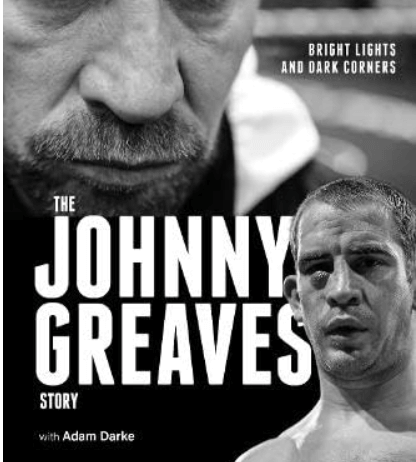
Johnny Greaves was a professional loser. He had one hundred professional fights between 2007 and 2013, lost 96 of them, scored one knockout, and was stopped short of the distance twelve times. There was no subtlety in how his role was explained to him: “Look, Johnny; professional boxing works two ways. You’re either a ticket-seller and make money for the promoter, in which case you get to win fights. If you don’t sell tickets but can look after yourself a bit, you become an opponent and you fight to lose.”
By losing, he could make upwards of one thousand pounds for a night‘s work.
Greaves grew up with an alcoholic father who beat his children and wife. Johnny learned how to survive the beatings, which is what his career as a fighter would become. He was a scared, angry, often violent child who was expelled from school and found solace in alcohol and drugs.
The fighters Greaves lost to in the pros ran the gamut from inept local favorites to future champions Liam Walsh, Anthony Crolla, Lee Selby, Gavin Rees, and Jack Catterall. Alcohol and drugs remained constants in his life. He fought after drinking, smoking weed, and snorting cocaine on the night before – and sometimes on the day of – a fight. On multiple occasions, he came close to committing suicide. His goal in boxing ultimately became to have one hundred professional fights.
On rare occasions, two professional losers – “journeymen,” they’re called in The UK – are matched against each other. That was how Greaves got three of the four wins on his ledger. On September 29, 2013, he fought the one hundredth and final fight of his career against Dan Carr in London’s famed York Hall. Carr had a 2-42-2 ring record and would finish his career with three wins in ninety outings. Greaves-Carr was a fight that Johnny could win. He emerged triumphant on a four-round decision.
The Johnny Greaves Story, told by Greaves with the help of Adam Darke (Pitch Publishing) tells the whole sordid tale. Some of Greaves’s thoughts follow:
* “We all knew why we were there, and it wasn’t to win. The home fighters were the guys who had sold all the tickets and were deemed to have some talent. We were the scum. We knew our role. Give some young prospect a bit of a workout, keep out of the way of any big shots, lose on points but take home a wedge of cash, and fight again next week.”
* “If you fought too hard and won, then you wouldn’t get booked for any more shows. If you swung for the trees and got cut or knocked out, then you couldn’t fight for another 28 days. So what were you supposed to do? The answer was to LOOK like you were trying to win but be clever in the process. Slip and move, feint, throw little shots that were rangefinders, hold on, waste time. There was an art to this game, and I was quickly learning what a cynical business it was.”
* “The unknown for the journeyman was always how good your opponent might be. He could be a future world champion. Or he might be some hyped-up nightclub bouncer with a big following who was making lots of money for the promoter.”
* “No matter how well I fought, I wasn’t going to be getting any decisions. These fights weren’t scored fairly. The referees and judges understood who the paymasters were and they played the game. What was the point of having a go and being the best version of you if nobody was going to recognize or reward it?”
* “When I first stepped into the professional arena, I believed I was tough. believed that nobody could stop me. But fight by fight, those ideas were being challenged and broken down. Once you know that you can be hurt, dropped and knocked out, you’re never quite the same fighter.”
* “I had started off with a dream, an idea of what boxing was and what it would do for me. It was going to be a place where I could prove my toughness. A place that I could escape to and be someone else for a while. For a while, boxing was that place. But it wore me down to the point that I stopped caring. I’d grown sick and tired of it all. I wished that I could feel pride at what I’d achieved. But most of the time, I just felt like a loser.”
* “The fights were getting much more difficult, the damage to my body and my psyche taking longer and longer to repair after each defeat. I was putting myself in more and more danger with each passing fight. I was getting hurt more often and stopped more regularly. Even with the 28-day [suspensions], I didn’t have time to heal. I was staggering from one fight to the next and picking up more injuries along the way.”
* “I was losing my toughness and resilience. When that’s all you’ve ever had, it’s a hard thing to accept. Drink and drugs had always been present in my life. But now they became a regular part of my pre-fight preparation. It helped to shut out the fear and quieted the thoughts and worries that I shouldn’t be doing this anymore.”
* “My body was broken. My hands were constantly sore with blisters and cuts. I had early arthritis in my hip and my teeth were a mess. I looked an absolute state and inside I felt worse. But I couldn’t stop fighting yet. Not before the 100.”
* “I had abused myself time after time and stood in front of better men, taking a beating when I could have been sensible and covered up. At the start, I was rarely dropped or stopped. Now it was becoming a regular part of the game. Most of the guys I was facing were a lot better than me. This was mainly about survival.”
* “Was my brain f***ed from taking too many punches? I knew it was, to be honest. I could feel my speech changing and memory going. I was mentally unwell and shouldn’t have been fighting but the promoters didn’t care. Johnny Greaves was still a good booking. Maybe an even better one now that he might get knocked out.”
* “Nobody gave a f*** about me and whether I lived or died. I didn’t care about that much either. But the thought of being humiliated, knocked out in front of all those people; that was worse than the thought of dying. The idea of being exposed for what I was – a nobody.”
* “I was a miserable bastard in real life. A depressive downbeat mouthy little f***er. Everything I’ve done has been to mask the feeling that I’m worthless. That I have no value. The drinks and the drugs just helped me to forget that for a while. I still frighten myself a lot. My thoughts scare me. Do I really want to be here for the next thirty or forty years? I don’t know. If suicide wasn’t so impactful on people around you, I would have taken that leap. I don’t enjoy life and never have.”
So . . . Any questions?
****
Steve Albert was Showtime’s blow-by-blow commentator for two decades. But his reach extended far beyond boxing.
Albert’s sojourn through professional sports began in high school when he was a ball boy for the New York Knicks. Over the years, he was behind the microphone for more than a dozen teams in eleven leagues including four NBA franchises.
Putting the length of that trajectory in perspective . . . As a ballboy, Steve handed bottles of water and towels to a Knicks back-up forward named Phil Jackson. Later, they worked together as commentators for the New Jersey Nets. Then Steve provided the soundtrack for some of Jackson’s triumphs when he won eleven NBA championships as head coach of the Chicago Bulls and Los Angeles Lakers.
It’s also a matter of record that Steve’s oldest brother, Marv, was arguably the greatest play-by-play announcer in NBA history. And brother Al enjoyed a successful career behind the microphone after playing professional hockey.
Now Steve has written a memoir titled A Funny Thing Happened on the Way to the Broadcast Booth. Those who know him know that Steve doesn’t like to say bad things about people. And he doesn’t here. Nor does he delve into the inner workings of sports media or the sports dream machine. The book is largely a collection of lighthearted personal recollections, although there are times when the gravity of boxing forces reflection.
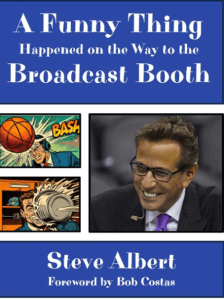
“Fighters were unlike any other professional athletes I had ever encountered,” Albert writes. “Many were products of incomprehensible backgrounds, fiercely tough neighborhoods, ghettos and, in some cases, jungles. Some got into the sport because they were bullied as children. For others, boxing was a means of survival. In many cases, it was an escape from a way of life that most people couldn’t even fathom.”
At one point, Steve recounts a ringside ritual that he followed when he was behind the microphone for Showtime Boxing: “I would precisely line up my trio of beverages – coffee, water, soda – on the far edge of the table closest to the ring apron. Perhaps the best advice I ever received from Ferdie [broadcast partner Ferdie Pacheco] was early on in my blow-by-blow career – ‘Always cover your coffee at ringside with an index card unless you like your coffee with cream, sugar, and blood.’”
Writing about the prelude to the infamous Holyfield-Tyson “bite fight,” Albert recalls, “I remember thinking that Tyson was going to do something unusual that night. I had this sinking feeling in my gut that he was going to pull something exceedingly out of the ordinary. His grousing about Holyfield’s head butts in the first fight added to my concern. [But] nobody could have foreseen what actually happened. Had I opened that broadcast with, ‘Folks, tonight I predict that Mike Tyson will bite off a chunk of Evander Holyfield’s ear,’ some fellas in white coats might have approached me and said, ‘Uh, Steve, could you come with us.'”
And then there’s my favorite line in the book: “I once asked a fighter if he was happily married,” Albert recounts. “He said, ‘Yes, but my wife’s not.'”
“All I ever wanted was to be a sportscaster,” Albert says in closing. “I didn’t always get it right, but I tried to do my job with honesty and integrity. For forty-five years, calling games was my life. I think it all worked out.”
Thomas Hauser’s email address is thomashauserwriter@gmail.com. His next book – The Most Honest Sport: Two More Years Inside Boxing – will be published this month and is available for preorder at:
https://www.amazon.com/Most-Honest-Sport-Inside-Boxing/dp/1955836329
In 2019, Hauser was selected for boxing’s highest honor – induction into the International Boxing Hall of Fame.
To comment on this story in the Fight Forum CLICK HERE
-
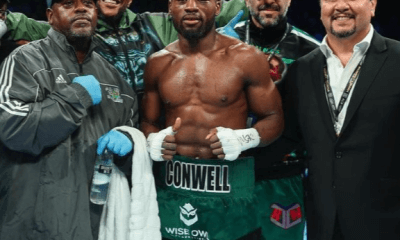
 Featured Articles4 weeks ago
Featured Articles4 weeks agoAvila Perspective, Chap. 322: Super Welterweight Week in SoCal
-
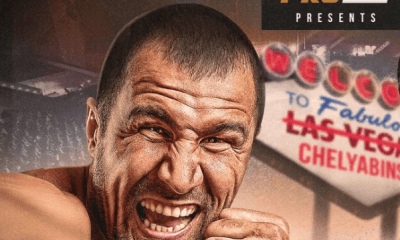
 Featured Articles4 weeks ago
Featured Articles4 weeks ago‘Krusher’ Kovalev Exits on a Winning Note: TKOs Artur Mann in his ‘Farewell Fight’
-
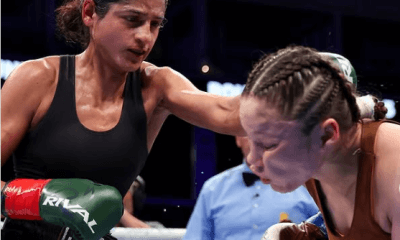
 Featured Articles4 weeks ago
Featured Articles4 weeks agoGabriela Fundora KOs Marilyn Badillo and Perez Upsets Conwell in Oceanside
-

 Featured Articles4 weeks ago
Featured Articles4 weeks agoFloyd Mayweather has Another Phenom and his name is Curmel Moton
-
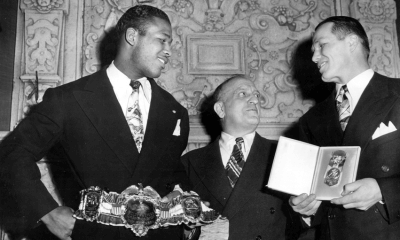
 Featured Articles4 weeks ago
Featured Articles4 weeks agoArne’s Almanac: The First Boxing Writers Assoc. of America Dinner Was Quite the Shindig
-
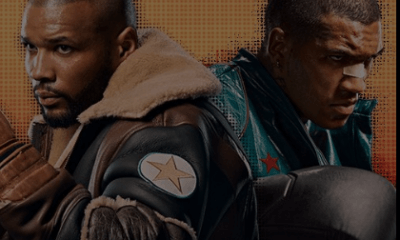
 Featured Articles3 weeks ago
Featured Articles3 weeks agoAvila Perspective, Chap. 323: Benn vs Eubank Family Feud and More
-
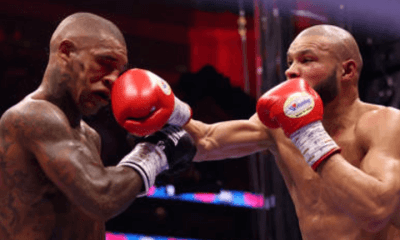
 Featured Articles3 weeks ago
Featured Articles3 weeks agoChris Eubank Jr Outlasts Conor Benn at Tottenham Hotspur Stadium
-
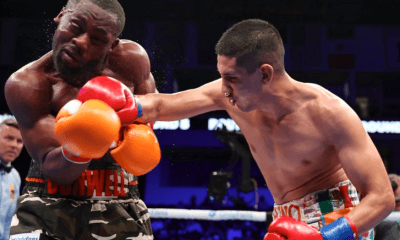
 Featured Articles3 weeks ago
Featured Articles3 weeks agoJorge Garcia is the TSS Fighter of the Month for April















